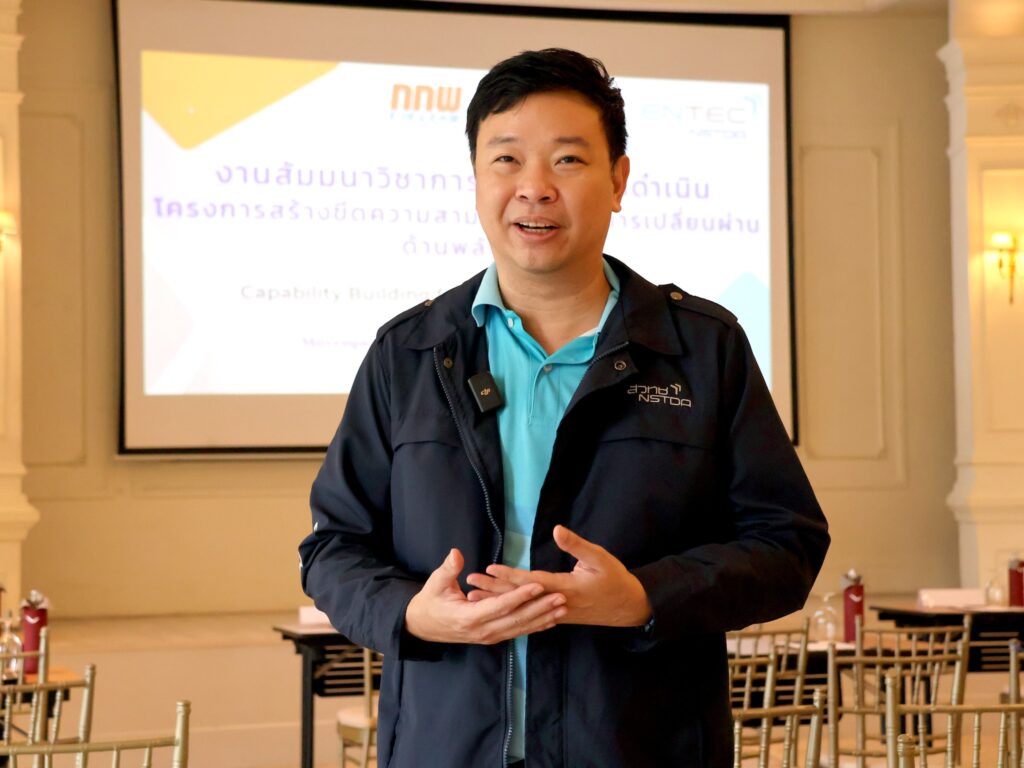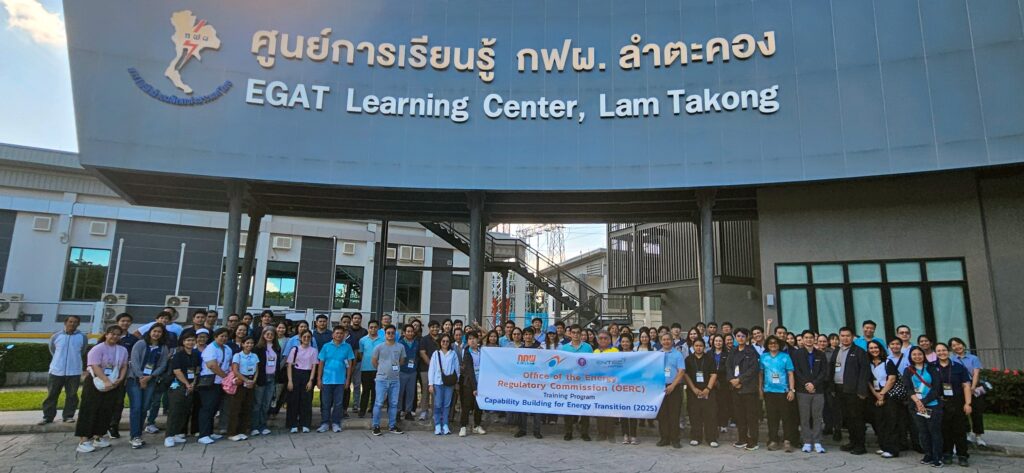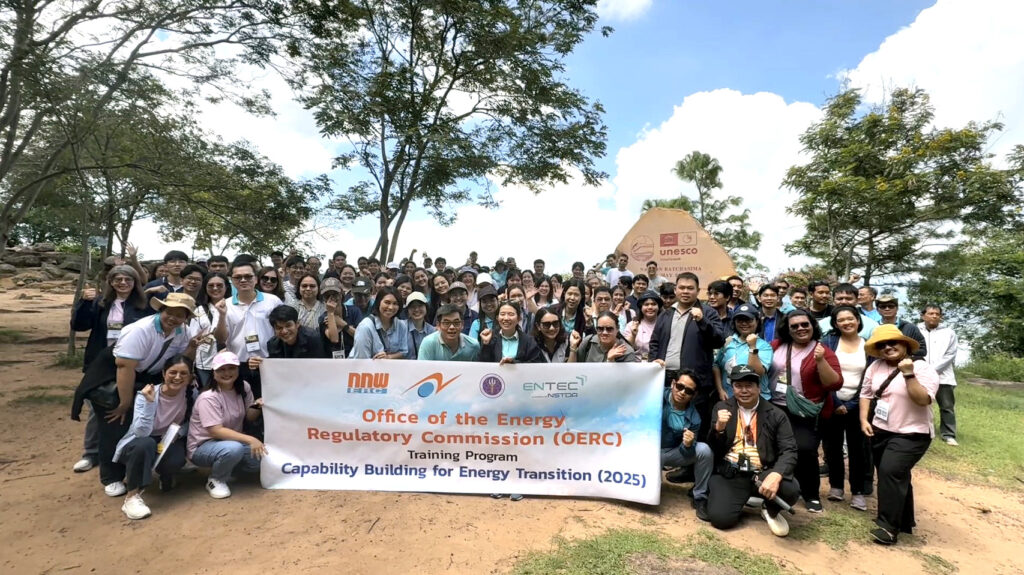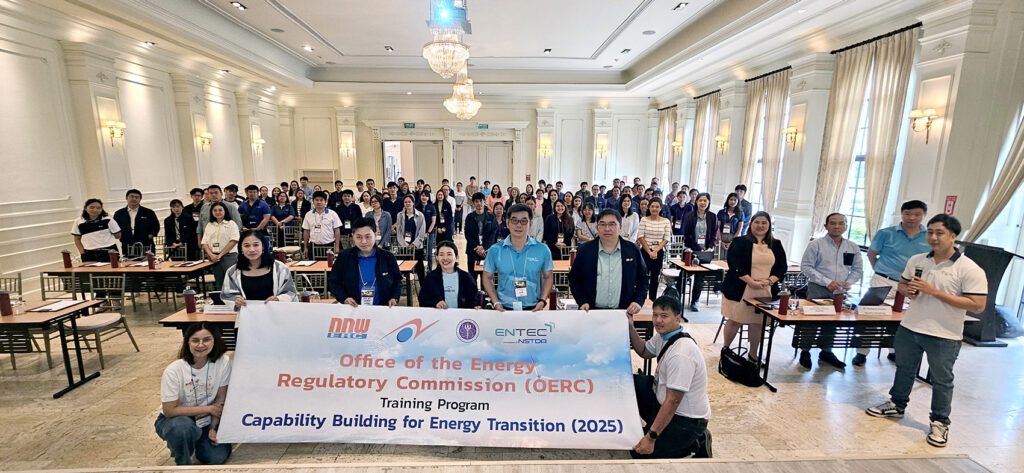On October 2–3, 2025, at Movenpick Resort Khao Yai, Nakhon Ratchasima Province
The National Energy Technology Center (ENTEC), under the National Science and Technology Development Agency (NSTDA), in collaboration with the Energy Regulatory Commission (ERC), organized a seminar to summarize the “Capability Building for Energy Transition (2025)” project. The project aims to enhance personnel capabilities to support the ongoing energy transition. The event was presided over by Mr. Prasit Siritiprussamee, Deputy Secretary-General of the ERC.

Mr. Prasit Siritiprussamee, stated that the training activities under this project aim to build knowledge and skills for ERC personnel—both at central and regional levels—in technical fields, modern technologies, and innovations, in preparation for future changes in the energy sector. He highlighted ENTEC as the ideal partner in engineering and technology, citing its extensive expertise and commitment to ongoing innovation. The ERC, as the national energy regulatory agency, must draw upon expertise across expertise across engineering, legal, economic, and financial perspectives. This partnership between ENTEC and ERC serves as a vital bridge connecting these interdisciplinary areas.
The training program, now in its third year, started with a pilot short course and has since been developed into a full curriculum. Each year, the content is updated to reflect technological and policy developments. For example, this year’s program included a module on Small Modular Reactors (SMRs) to help ERC staff stay informed about nuclear technologies potentially relevant to the country’s future power development plans.
Mr. Prasit also noted that the ERC plans to make energy data a core focus of the curriculum, supporting the development of advanced technologies such as Artificial Intelligence (AI) and Smart Grids, which rely heavily on data-driven management. He emphasized that this initiative is not just a short-term project but aligns with the ERC’s five-year strategic plan and represents a long-term collaboration that will enhance regulatory efficiency, ensure transparency and fairness, and support Thailand’s competitiveness in the global clean energy transition.

Dr. Sumittra Charojrochkul, Executive Director of ENTEC, stated that the project has been ongoing for several months, directly targeting capacity building for ERC officers to equip them with knowledge in global energy transitions. Activities include academic training and international study visit to Japan to learn about energy policy, research, and technological advancements. This event marked the official conclusion of the 2025 training program. Looking ahead to 2026, ENTEC aims to support policy and regulatory research to further enhance the ERC’s role as an energy regulator. ENTEC is confident that our support can provide the technical expertise needed for the ERC to keep pace with global developments.
She emphasized that energy transition is a long-term process requiring clear direction, long-term goals, and thorough preparation in both human resources and infrastructure. The collaboration with ERC plays a vital role in providing real-time updates on global energy trends, such as the rising importance of small nuclear reactors in the past few years. She concluded that one of the key impacts of this program is ensuring that ERC decisions are based on up-to-date and comprehensive knowledge, allowing Thailand to adopt new technologies with clarity and make informed, cost-effective decisions.

Dr. Visarn Lilavivat, ENTEC researcher and project leader, added that this training initiative not only boosts the capabilities of ERC personnel but also benefits ENTEC staff by fostering knowledge exchange and building networks. The program focused on transferring technological knowledge, policy updates, and insights into both national and global energy directions. This enables ERC officers to effectively apply this knowledge in regulatory practices.
Topics covered during the seminar included trends such as hydrogen energy and small nuclear reactor technologies, which are critical for Thailand’s Carbon Neutrality goals. Developing clean energy sources beyond solar and wind is essential for diversifying the country’s energy portfolio.
Dr. Visarn stressed the need for continuous knowledge development in the energy field, as technology evolves rapidly. These training programs prepare ERC personnel to regulate the modern energy sector, reduce greenhouse gas emissions, and support Thailand’s environmental goals. ENTEC aims to expand the program to include private sector stakeholders, government agencies, and other energy-related organizations, creating a broader knowledge-sharing network. The project has seen increasing participation and has been well-received—not only in numbers, but more importantly in knowledge transfer and long-term collaboration.


The seminar focused on raising awareness and understanding of the energy transition, led by Dr. Nuwong Chollacoop, Director of the Low Carbon Energy Research Group at ENTEC, who played a key role in curriculum design and promoting clean energy knowledge through national and international collaborations. All workshops and study visits were also part of the training to provide hands-on experiences, enabling ERC staff to gain a holistic view of energy technologies and regulatory trends.






Key topics included:
- Energy Transition and Energy Storage Technology, presented by Dr. Pimpa Limthongkul, Director of the Energy Innovation Research Group at ENTEC
- Renewable Energy Certificates (REC) and Carbon Border Adjustment Mechanism (CBAM), presented by Ms. Malchutar Kingnet, Head of Strategic Partnership at InnoPower Co., Ltd.
- Hydrogenase Enzymes in Photobiocatalytic Hydrogen Production, presented by Dr. Nuttavut Kosem from Kyushu University, Japan
Participants also visited Khao Yai Thiang Windmill and the EGAT Learning Center at Lam Takong, two key learning hubs for renewable energy and environmental stewardship, offering inspiration and practical insights to drive Thailand’s clean energy future.





